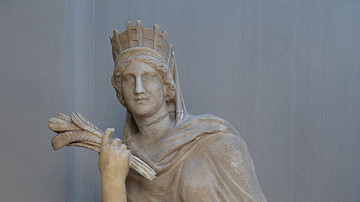Search
Search Results

Definition
Tyche
In Greek mythology, Tyche is the goddess and personification of good luck, chance, and fortune. Tyche's popularity grew after the Classical period when many cities and officials across the Greek world and the Mediterranean adopted her as...

Definition
Celtic Warfare
The Celts were a linguistic group which spanned across a wide geographic area and included numerous cultures and ethnicities. Because of this fact, the traditions, practices, and lifestyles of Celtic-speaking peoples varied considerably...

Definition
Perdiccas
Perdiccas (d. 321 BCE) was one of Alexander the Great's commanders, and after his death, custodian of the treasury, regent over Philip III and Alexander IV, and commander of the royal army. When Alexander the Great crossed the Hellespont...

Definition
Persian Wars
The Persian Wars refers to the conflict between Greece and Persia in the 5th century BCE which involved two invasions by the latter in 490 and 480 BCE. Several of the most famous and significant battles in history were fought during the Wars...

Definition
Sparta
Sparta was one of the most important city-states in ancient Greece and was famous for its military prowess. The professional and well-trained Spartan hoplites with their distinctive red cloaks and long hair were probably the best and most...

Definition
Corinth
Corinth was a Greek, Hellenistic and Roman city located on the isthmus which connects mainland Greece with the Peloponnese. Surrounded by fertile plains and blessed with natural springs, ancient Corinth was a centre of trade, had a naval...

Definition
Hoplite - The Key Infantry Soldier of Ancient Greece
A hoplite (from ta hopla meaning tool or equipment) was the most common type of heavily armed foot-soldier in ancient Greece from the 7th to 4th centuries BCE, and most ordinary citizens of Greek city-states with sufficient means were expected...

Definition
Delphi
Delphi was an important ancient Greek religious sanctuary sacred to the god Apollo. Located on Mt. Parnassus near the Gulf of Corinth, it was home to the famous oracle of Apollo which gave cryptic predictions and guidance to both city-states...

Definition
Peloponnese
The Peloponnese is a large peninsula linked to the northern territory of Greece by the Isthmus of Corinth. To the west of the Peloponnese is the Ionian sea while to the east is the Aegean Sea. The terrain is typified by high limestone mountains...

Definition
Olympia
Ancient Olympia was an ancient Greek sanctuary site dedicated to the worship of Zeus located in the western Peloponnese. The Pan-Hellenic Olympic Games were held at the site in honour of Zeus every four years from 776 BCE to 393 CE. Olympia...